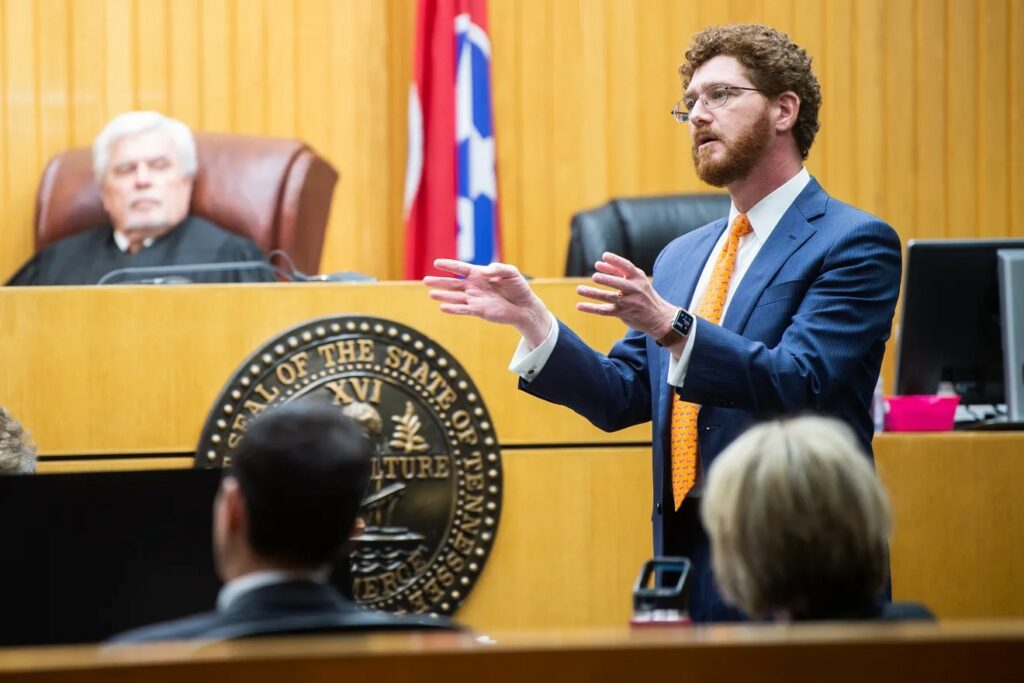The Case of Aaron Valentine: A Battle for Free Speech Amidst Political Prosecution
In the heart of Knoxville, Tennessee, the echoes of past injustices reverberated as four activists found themselves entangled in a legal battle over their right to protest peacefully. Among them stands Aaron Valentine and his comrades, vocal advocates for police accountability, whose defense now becomes emblematic of a broader struggle for free speech in the face of diminished government transparency and politically motivated prosecution.
The trial, set against the backdrop of Tennessee’s recent attempts to clamp down on peaceful demonstrations following the murder of George Floyd and the resulting demonstrations on behalf of the Black Lives Matter movement, sheds light on the delicate balance between civil liberties and government authority. At its core lies the fundamental question: Can the state stifle dissenting voices under the guise of maintaining order?
The genesis of this legal saga traces back to the tragic events that unfolded at Austin-East Magnet High School, where the fatal shooting of 17-year-old Anthony Thompson Jr. by law enforcement ignited a wave of protests demanding transparency and justice. In the aftermath, activists like Valentine took to the streets, calling for accountability and the release of body camera footage.
Anthony Thompson, Jr. was shot and killed in the bathroom of his high school by law enforcement. It was the first such questionable police shooting following the legislative installation of body cameras after like protests and questions surrounding the police shooting death of Philly Pheap in 2019. Mr. Pheap’s death after being shot in the back by a Knoxville police officer, and the community’s demand for answers and accountability resulted in legislation providing for funding to equip officers with cameras and require that they record all interactions with the public.
Despite this requirement, in the days after Thompson’s killing there was wide confusion over what exactly had transpired. Law enforcement issued conflicting statements over who had fired the fatal shot. The community wanted answers and felt frustrated that the video footage was being hidden from them. As time passed, people became suspicious of why the government was not being open about the matter. Protestors demanding accountability for Thompson, Pheap, and for Black Lives Matter were largely the same united, successful voices who were proving to be a bit of a thorn in the side of the district attorney and law enforcement administration.
Their continued advocacy did not sit well with the authorities, who seemed content to do nothing. In the first County Commission meeting after the shooting, the matter did not appear on the agenda. This upset community members who thought that a child being shot at school by law enforcement deserved some conversation. Community leaders demanded answers but in a chilling display of power, Valentine and his fellow demonstrators found themselves arrested and facing charges of disrupting the public meeting of the County Commission. The prosecution’s narrative tried to paint them as agitators, disrupting the peace and hindering the functioning of government bodies.
On the other hand, several previous County Commission meetings were disrupted by a small but also vocal group in opposition to the mask mandates at the height of the COVID pandemic. None of these protestors were arrested. This was the scary part, as the laws were not being applied equally but instead in an attempt to silence dissent. Making matters worse was the appearance that white protestors were not being arrested while members of the African-American community were being dragged out in handcuffs.
At trial, we urged the jury to recall that the right to peaceful protest is a cornerstone of democracy, enshrined in the very fabric of American society, and the government should not be allowed to incarcerate people for speaking up for their views on political matters.
Valentine’s defense attorney, Knox Defense’s own Joshua Hedrick, articulated this sentiment eloquently, emphasizing that his client’s actions were rooted in a sincere desire for justice and accountability. He contended that targeting Valentine and his fellow activists was a blatant violation of their constitutional rights, a thinly veiled attempt to suppress dissenting voices and maintain the status quo.
Indeed, the parallels with past struggles for civil rights are stark. Just as the civil rights activists of the 1960s faced persecution for challenging systemic injustices, Valentine and his comrades find themselves at odds with a system that seeks to silence them. But like their predecessors, they refuse to be silenced, standing firm in their belief that the pursuit of justice knows no bounds.
In the end, Valentine and most of his fellow activists emerged victorious, their defiance serving as a beacon of hope for all those who dare to speak truth to power, for racial equality, and social justice. Only Constance Early, the most vocal of the activists in all of the underlying instances, was found guilty. She is expected to appeal and challenge the constitutionality of Tennessee’s attempt to quash inalienable rights related to freedom of speech and assembly as permitted by the First Amendment to the United States Constitution.
We must remember that as Americans we have permitted the government to use power but we have not given ourselves to the government. It serves at our pleasure and we always keep the right to assemble, to attend public meetings, and to have our voices heard.

FREE CONFIDENTIAL CONSULTATION

